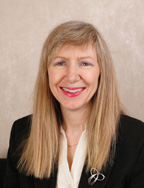
Michelle Stauffer | KANSAS AIRCRAFT CORP
Leap and you will learn to fly. That’s Michele Stauffer’s advice to women starting their own companies. “Go for it. You don’t know what you are capable of doing until you try. Follow your passion. The only shame would be not trying,” says Stauffer, president of Kansas Aircraft Corp. “I didn’t have a business plan in place or financial backing. I went to a banker who was a pilot and asked for a floor plan that would enable me to buy airplanes for inventory or resell. Fortunately, he believed in me and he gave me a small floor plan. I worked out of my house until I could afford office space at (New Century) airport.”
Stauffer learned that faith could overcome fear of the unknown, and that hard work gives you the strength to clear obstacles. Her mentor—her mother—imparted those values upon her.
“She taught me … to work hard, to take time to play, to pray and to give to others that are less fortunate,” Stauffer said. “She encouraged me when I wanted to learn to fly. When I wanted to try to sell airplanes—remember, this was 1977—she encouraged me again, even though everyone else said I was nuts.”
With more women in the executive work force, Stauffer believes there will be more concern beyond the bottom line. “Women will integrate concerns regarding family well-being, health care and education.” Men may be concerned about those factors, too, she said, but “I believe a woman has a different perspective.”

Julie Runtz Welch | MEARA WELCH BROWNE
Julie Runtz Welch inherited her determination from her mother, and it has served her well. “Most people give up before they achieve their goals because they don’t have the fortitude to stick with their plan,” she says. “If you are willing to work harder than your peers, you will achieve your goals,” said Welch, a certified public accountant, a partner/shareholder and director of the tax department at the Meara Welch Browne accounting firm. Finding and hiring qualified associates, she says, has become a challenge as enrollments of accounting students have declined and competition for them has increased. But “a key lesson learned is that flexibility is crucial. You have to be able to re-position at a moment’s notice and anticipate what is happening in the economy, with your competition and with your company. … Being on the cutting edge of technology makes your associates more productive, but that cutting edge can cut back. This experience has taught me that I am capable of dealing with crises in a constructive manner.”
She believes women bring a unique perspective to the work force, but to tap that potential, “businesses must remain flexible and learn to work with women who, often, are raising a family in addition to building their career,” she said. “Businesses that want to develop and promote talented women will need to use technology to offer flexibility in how people perform their jobs. Work doesn’t necessarily have to occur in a 9-to-5 office setting.”

Brenda Tinnen | SPRINT CENTER/AEG
Brenda Tinnen followed in the footsteps of her mother, her mentor, who worked in the same industry for more than 40 years. “The most important lesson she taught me was the Golden Rule, to treat people the way you would like to be treated, and to always act like a lady.”
Tinnen’s advice to other women is to stay focused and not worry about gender differences, like if a male colleague gets a promotion before you do. “Just work hard at what you’re doing and be the person that is invaluable to the process,”
she said. “It doesn’t make a difference if you’re male or female, you’ll be rewarded. Maybe not financially, but sometimes you need to enjoy successes on a personal level.”
Tinnen has plenty of success to enjoy. In her role as senior vice president and general manager, she is credited with establishing the Sprint Center as one of the world’s busiest arenas. She has booked nearly 400 events attracting nearly 4 million guests since its opening four years ago. One challenge Tinnen has managed to overcome is the lack of major sports franchise.
“It was never a full-fledged promise. We hoped we could attract an NBA or NHL franchise,” she said. “Some people would like to see a team, but they’re happy with the diversity of programming that we’ve been able to bring to Kansas City. We continue to keep our eyes open for teams, but also for the right investor groups that are interested in bringing a team to Kansas City.”